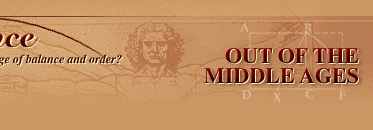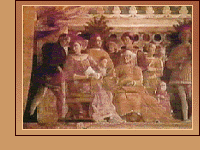  |
 In the feudal structure of the Middle Ages, the nobles who lived in the country provided the king with protection in exchange for land. Peasants worked the land for the nobles, for which they received protection and their own small parcels of land. These rural peasants worked from sunup to sundown, but even the nobles had few creature comforts. In feudal cities, where there was a small middle-class population, life was a little easier and individuals had the freedom to pursue whatever trade or industry they liked. In the late Middle Ages, when the threat of invasion from barbarians had lessened, people left the country for towns and cities so they could engage in more profitable pursuits.
Life in the city was soon to change drastically. During the late Middle Ages and early Renaissance (1350-1450) the bubonic plague, also called the "Black Death," devastated one half of the population of Europe. The plague, which was almost always fatal, spread most rapidly in cities, where people were in close contact with each other. The only way to avoid the disease was to leave the city for the country. This solution was, unfortunately, available only to those wealthy enough to make the trip. The Plague's Effect on the EconomyThe population decrease caused by the plague led to an economic depression. Merchants and tradespeople had fewer people to whom they could sell their wares. Products therefore accumulated, and the merchants and traders suffered a loss in income. Economic hardship spread throughout the community as those who dealt with the merchants--bankers, suppliers, and shippers--also lost revenue. As incidence of the plague decreased in the late fifteenth century, populations swelled, creating a new demand for goods and services. A new middle class began to emerge as bankers, merchants, and tradespeople once again had a market for their goods and services.Read more about the new middle class and the resurgence of cities. | |||
